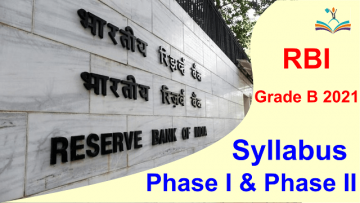
RBI Grade B is the eminent post one could achieve for a great life. It actually needs a lot of hard work and strong determination.
There are three different posts for RBI Grade B –
1. Grade B- DR General
2. Grade B- DR DEPR
3. Grade B- DR DSIM
Let’s look at the pattern of the exams to ace it successfully –
RBI exam takes place in three stages:-
1. Phase I Exam
2. Phase II Exam
3. Interview
Phase 1

So, there are four subjects in the phase 1 exam containing 200 marks and 0.25 negative marking for every wrong answer.
Phase -2
| Subjects | No. of questions | Maximum Marks | Duration (minutes) | |
| 1. | Paper I: Economics and Social Issues | Objective- 50%Descriptive-50% (4 have to be answered out of 6 questions) | 50 50Total-100 | 30 90 Total-120 minutes |
| 2. | Paper II: English (Writing Skills) | Descriptive(3) | 100 | 90 minutes |
| 3. | Paper III: Finance and Management | Objective- 50% Descriptive-50% (4 have to be answered out of 6 questions) | 50 50 Total-100 | 30 90 Total-120 minutes |
Syllabus for phase 1
Reasoning:-
Puzzles, seating arrangement, Data sufficiency, Direction & Distance, Blood relations, Syllogism, Coding-Decoding, Inequality, Alpha-numeric series, Input & output, Tabulation.
Quantitative Aptitude:-
Start daily practice of calculations and Learn Tables, square & square roots.
- Simplifications/ Approximations, quadratic equations, Number series, Data Interpretation
- Arithmetical Section – Surds& Indices, Compound Interest, Simple Interest, Time& Distance, Time& work, Time& Train Mixtures& Allegations, Number system, Ratio& proportions, Profit & Loss, Mensuration , Average, Percentage, Probability
English Language:-
First of all, make full command on Grammar section, Read newspaper and Learn Vocabulary and practice as much comprehension and writings as you can to develop the perfect speed and understanding of the concept.
- Reading comprehension, Para-jumbles, Cloze test, Fillers, Common Error
General Awareness:-
Current affairs, Financial & economics news, Static G.K, Banking awareness, Banking terms & rates, Government schemes, Reports, Monetary policies
Syllabus for Phase 2
Paper 1(Economics & Social Issues)
- Growth & Development- Measurement of Growth-National Income, Per capita Income, Poverty Alleviation and Employment generation in India, Sustainable development and environmental issues.
- Indian Economy – Economic History of India; Changes in Industrial and Labour Policy, Monetary & Fiscal Policy since reforms of 1991; Priorities and recommendations of economic survey and Union Budget; Indian Money & Financial Markets- Linkages with the economy; Role of Indian banks and Reserve Bank in the development process; Public finance; Political Economy; Industrial developments in India-Indian agriculture; Services sector in India.
- Globalization – Opening up of the Indian Economy; Balance of Payments & Export-Import Policy; International Economic Institutions; IMF and World Bank; WTO; Regional Economic Cooperation; International Economic Issues.
Social Structure in India –Multiculturalism; Demographic Trends; Urbanization and Migration; Gender Issues; Social Justice- Positive Discrimination in favour of the underprivileged; Social Movements; Indian Political System; Human Development; Social Sectors in India ,Health and Education.
Paper 2(English Descriptive)
You will be asked to write an Essay and Precise, also solve a few questions based on a given passage.
Finance:-
Financial System
- Regulators of Banks & Financial Institutions
- Functions of RBI, conduct of monetary policy, Banking system of India, Financial Institutions
Financial Markets
- Primary & Secondary markets (Forex, Money, Bond, Equity), Functions, Instruments, Recent developments.
General Topics
- Risk Management in Banking sector
- Basics of Derivatives: Forward, Futures and Swap
- Changing landscape of Banking sector
- Recent developments in Financial sector, Portfolio investment, Public sector reforms, Disinvestments
- Financial Inclusion – Use of technology
- Alternate source of Finance, private and social cost-benefit, Public-Private partnership
- Corporate Governance in Banking sector, role of e-governance in addressing the issues of corruption & inefficiency in the government sector
- The Union budget – Direct and indirect taxes; Non-tax sources of Revenue, GST, 13th Finance Commission and GST, Finance commission, Fiscal policy, Fiscal responsibility and budget management act
- Inflation: Definition, trends, estimates, consequences, and remedies: WPI, CPI – components of trends.
Management:-
(B)Management: Management: its nature and scope; The Management Processes; Planning, Organisation, Staffing, Directing and Controlling; The Role of a Manager in an Organisation. Leadership: The Tasks of a Leader; Leadership Styles; Leadership Theories; A successful Leader versus an effective Leader. Human Resource Development: Concept of HRD; Goals of HRD; Performance Appraisal – Potential appraisal and development – Feedback and Performance Counselling – Career Planning – Training and Development – Rewards – Employee Welfare. Motivation, Morale and Incentives: Theories of Motivation; How Managers Motivate; Concept of Morale; Factors determining morale; Role of Incentives in Building up Morale. Communication: Steps in the Communication Process; Communication Channels; Oral versus Written Communication; Verbal versus non-verbal Communication; upward, downward and lateral communication; Barriers to Communication, Role of Information Technology. Corporate Governance: Factors affecting Corporate Governance; Mechanisms of Corporate Governance.
Exam pattern for DEPR
| Paper | Duration | Marks | |
| Phase 1(Objective) | Paper-I Economics | 2 hrs | 100 |
| Phase 2(Descriptive) | Paper-II Economics | 3 hrs | 100 |
| Paper-III English | 90 Mins | 100 |
Syllabus of DEPR, for economics will be according to Master degree exam.
Exam pattern for DSIM
| Paper | Duration | Marks | |
| Phase 1(Objective) | Paper-I Statistics | 2 hrs | 100 |
| Phase 2(Descriptive) | Paper-II Statistics | 3 hrs | 100 |
| Paper-III English | 90 Mins | 100 |
Syllabus for DSIM:-
Paper 1-
Probability
Definition of Probability
Standard distribution
Large and small sample theory
Analysis of Variance
Estimation
Testing of Hypotheses
Multivariate analysis
Stochastic Processes
Paper 2-
Linear Models and Economic Statistics
Stochastic Processes
Multivariate analysis
Numerical Analysis and Basic Computer Techniques
Probability and Sampling
Statistical Inference
Paper 3 will tests the writing skills of the candidates.


